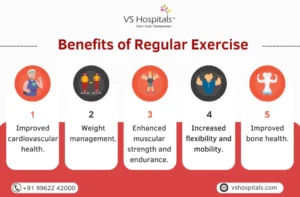Understanding the Importance of Exercise
Exercise plays a fundamental role in maintaining physical health and overall well-being. Engaging in regular physical activity is crucial for individuals of all ages, as it contributes to both physical fitness and psychological health. The underlying principles of exercise include enhancing cardiovascular health, improving muscular strength, and promoting flexibility. These elements collectively support the body’s ability to perform daily tasks efficiently while reducing the risk of chronic diseases as one ages.
According to guidelines established by health organizations such as the World Health Organization (WHO), adults should engage in at least 150 minutes of moderate aerobic activity or 75 minutes of vigorous activity each week. For children and adolescents, it is recommended to partake in at least one hour of physical activity daily. This structured approach to exercise not only fosters a healthier lifestyle but also aids in the development and maintenance of essential bodily functions.
The correlation between regular exercise and longevity is well-documented. Engaging in routine physical activity has been linked to lower rates of mortality and a higher quality of life. Improved cardiovascular health, enhanced mood, and stronger muscles contribute to an overall greater sense of wellness. Yet, society has seen a notable shift towards more sedentary lifestyles, driven by technological advances and the increasing prevalence of desk jobs. This shift often results in negative health implications, such as obesity, diabetes, and mental health disorders.
In light of these changes, it becomes imperative to prioritize physical activity across all demographics. By understanding and valuing the importance of exercise, individuals can combat the adverse effects of a sedentary lifestyle and promote a healthier future. Regular engagement in exercise not only enhances individual health outcomes but also fosters a more active and vibrant society.
Physical Health Benefits

Regular exercise is a cornerstone of maintaining optimal physical health and contributes significantly to various physiological markers and functions. Weight management is one of the primary benefits associated with frequent physical activity. Engaging in regular exercise aids in burning calories, which is essential for individuals striving to attain or maintain a healthy body weight. According to research, consistent exercise can enhance metabolic rate, thereby facilitating effective weight control and reducing the likelihood of obesity.
Another critical aspect of physical health bolstered by regular exercise is cardiovascular health. Engaging in activities such as running, swimming, or cycling strengthens the heart and improves circulation, leading to lower blood pressure and improved cholesterol levels. Clinical studies have shown that individuals who partake in regular aerobic exercise are at a significantly reduced risk of developing chronic conditions such as heart disease and stroke. The protective effects of such activities result from improved endothelial function and reduced arterial stiffness, both crucial for sustaining cardiovascular well-being.
Muscular strength and overall skeletal health are also notable benefits of consistent exercise. Participation in resistance training helps build muscle mass and enhance bone density, reducing the risk of osteoporosis and muscular degeneration as one ages. Recent findings suggest that such strength training exercises not only improve physical resilience but also enhance balance, thereby mitigating the risk of falls among older adults. Regular engagement in physical activities, particularly those that strengthen muscles and bones, lays the groundwork for a robust musculoskeletal system capable of supporting daily activities.
In essence, the physical health benefits of regular exercise are manifold. From effective weight management and improved cardiovascular function to enhanced muscular strength and bone health, incorporating a well-rounded fitness routine is paramount for achieving a healthy body and reducing the risk of chronic diseases. Evidence supporting these advantages emphasizes the significance of prioritizing physical activity as an essential component of a holistic approach to health.
Mental Health Benefits
Regular exercise serves as a powerful catalyst for enhancing mental health and overall psychological well-being. Engaging in physical activity has been shown to significantly improve mood, combat symptoms of depression and anxiety, and sharpen cognitive function. The connection between exercise and improved mental health is fortified by various biochemical processes that occur during physical activity. One of the most notable is the release of endorphins, often referred to as the body’s natural painkillers. These neurotransmitters interact with receptors in the brain to create a sense of euphoria, which can alleviate feelings of stress and sadness.
Moreover, exercise stimulates the production of serotonin, a crucial neurotransmitter that helps regulate mood, sleep, and appetite. Increased levels of serotonin, often resulting from aerobic activities, have been associated with a reduction in depressive symptoms. Research has consistently shown that individuals who incorporate regular physical activity into their lives report lower levels of anxiety and depression compared to those who lead sedentary lifestyles.
Cognitive function also benefits from a commitment to regular exercise. Studies indicate that physical activity enhances memory, attention, and the ability to perform complex tasks. This improvement is attributed to increased blood flow to the brain during exercise, which promotes the growth of new neurons and strengthens existing neural connections. Scientific findings underscore the importance of maintaining an active lifestyle, as it not only bolsters mental health but also sustains cognitive efficiency as one ages.
Incorporating exercise into daily routines can achieve significant improvements in mental health outcomes. The multifaceted relationship between physical activity and psychological well-being highlights the necessity for individuals to prioritize fitness not just for physical health, but also for mental resilience and clarity.
Incorporating Exercise Into Daily Life
Incorporating regular exercise into daily routines can significantly enhance an individual’s overall health, regardless of their current fitness level. One effective approach is to start small and build from there. For instance, aim for short bouts of activity, such as brisk walking for 10-15 minutes several times a week. This can easily fit into a busy schedule and provides a solid foundation upon which to increase intensity and duration gradually.
Structured workout plans can be beneficial for those who prefer a more regimented approach. Joining local fitness classes, engaging in online workout videos, or enlisting a personal trainer can help provide guidance and motivation. On the other hand, casual activities like cycling, swimming, or even playing a sport can serve as enjoyable alternatives. These activities not only promote physical fitness but also provide opportunities for social interactions, enhancing motivation to remain active.
Setting achievable goals is essential to establishing a long-term exercise routine. First, define specific, measurable, attainable, relevant, and time-bound (SMART) objectives. For example, aiming to run a 5k within three months or increasing weekly cycling distances can serve as motivating targets. Tracking progress in a journal or fitness app can also bolster commitment, making it easier to celebrate small achievements along the way.
Maintaining motivation can be challenging, but finding enjoyable activities is crucial. Engaging friends or family in exercise routines can create a sense of accountability and community. Additionally, overcoming common barriers—such as time constraints or lack of access to facilities—can be accomplished by prioritizing exercise, whether at home or in the community. Ultimately, integrating enjoyable and varied forms of exercise into daily life is vital for fostering a lifelong commitment to health and well-being.






Leave a Reply